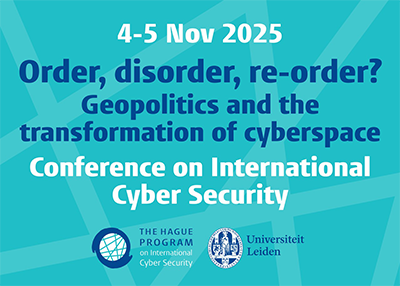
Photos and Conference Report | 2019 Conference on Cyber Norms: Dealing with Uncertainty
From 5-6 November 2019, we held our second annual conference, the 2019 Conference on Cyber Norms: Dealing with Uncertainty, at Het Spaansche Hof in The Hague, where we were joined by academics and other interested participants from across the world, for two days filled with four keynotes and 23 presentations during the parallel sessions.

Dealing with uncertainty: coping mechanisms and going beyond naming and shaming
The conference was opened by Bibi van den Berg, Full Professor of Cybersecurity Governance at the Faculty of Governance and Global Affairs, Leiden University and part of The Hague Program for Cyber Norms. Her lecture covered different types of uncertainty and several possible coping mechanisms to deal with uncertainty in cyberspace. During the day there were parallel sessions on the law and politics of attribution in cyberspace, the geopolitical implications of 5G, international law and diplomatic approaches to managing uncertainty in cyberspace, and conceptual approaches, metaphors and challenges in talking about cybersecurity. Duncan Hollis, Laura H. Carnell Professor of Law at Temple Law School, Temple University, gave the second keynote of the day, on accusations and international law in global cybersecurity, going beyond naming and shaming.
Drinks and dinner concluded the first day. The evening was opened by Carmen Gonsalves, Head of the Task Force International Cyber Policies of the Dutch Ministry of Foreign Affairs, with a short speech on the Dutch efforts in this space.
More of Day 1 in pictures:




Why cyber norms fail us, flipping the discourse and presentation of the best paper awards

Day 2 started off with a keynote by Lucas Kello, Associate Professor of International Relations, Director of the Centre for Technology and Global Affairs, and Co-director of the Interdisciplinary Centre for Doctoral Training in Cyber Security at the Department of Computer Science at University of Oxford. He spoke about cyber norms and why they fail us, addressing the failure of Western efforts to foster an international regime of cyber norms and what to do about it. Parallel sessions during this day discussed data protection and online political microtargeting, public-private interactions, regional perspectives from Turkey, Egypt and the UK before and after Brexit, and cyber insurance. The last keynote of the conference was given by Susan Landau, Bridge Professor of Cyber Security and Policy at the Fletcher School of Law and Diplomacy and the School of Engineering, Department of Computer Science, Tufts University. In her keynote on flipping the discourse, she discussed a potential way of signaling cyber capabilities without unleashing massive destruction.

Finally, two best paper awards were awarded during the closing of the conference by Dennis Broeders, Senior Fellow of The Hague Program for Cyber Norms and Associate Professor of Security and Technology at Leiden University. Monica Kaminska (Oxford University) was awarded for her paper “Restraint Under Conditions of Uncertainty: Why the West Tolerates Cyber Attacks”, presented during the Uncertainty and Cyber Insurance panel. Julia Slupska (Oxford Internet Institute / Oxford University) was awarded for her paper “War, Health & Ecosystem: Conceptual Metaphors in International Cybersecurity Policy”, presented during the Conceptual Approaches to Uncertainty & Cybersecurity panel. The winners won a ticket, travel & accommodation to next year’s conference on cyber norms.
More of Day 2 in pictures:




To stay informed of our next conference on cyber norms and other activities, you can subscribe to our newsletter here.
More photos found on our online gallery - when reposting/resharing any pictures, please link back to our website: www.thehaguecybernorms.nl.



































_400x286.png)



















































_400x286.jpg)



